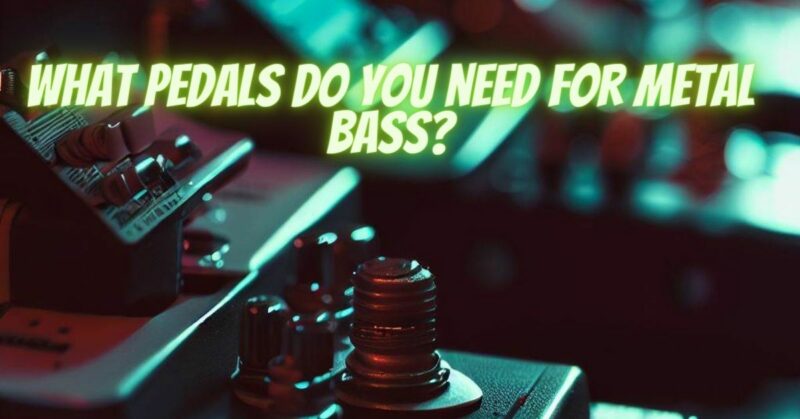Metal bass playing requires a powerful and aggressive tone that cuts through dense mixes and delivers thunderous low-end punch. To achieve this distinctive sound, incorporating the right combination of pedals into your bass rig is crucial. In this article, we will explore the essential pedals that every metal bassist should consider using to shape their tone and excel in the realm of heavy music.
- Bass Overdrive/Distortion Pedal:
A high-quality bass overdrive/distortion pedal is essential for metal bassists. It provides the grit, saturation, and sustain needed to add aggression and intensity to your tone. Look for a pedal specifically designed for bass that retains low-end clarity and definition while delivering the desired level of distortion or overdrive. Experiment with various settings to find the perfect balance between aggression and articulation.
- Bass Compressor Pedal:
A compressor pedal is invaluable in metal bass playing for achieving a consistent and controlled sound. It evens out the dynamics, enhances sustain, and helps maintain a tight and focused low-end. Use a compressor pedal to add punch and definition to your playing, ensuring that your bass lines cut through the mix with precision.
- Bass Octave Pedal:
An octave pedal is an essential tool for creating a massive, thick sound in metal bass playing. It generates an octave below your original pitch, adding depth and subsonic weight to your tone. This pedal can create an intense, ground-shaking effect that complements heavy guitar riffs and adds a formidable presence to your bass lines.
- Bass Fuzz Pedal:
A bass fuzz pedal can be a game-changer for metal bassists seeking a raw, aggressive, and saturated tone. Fuzz pedals add harmonic richness and sustain while retaining the low-end clarity. They are particularly effective for creating thick, heavy bass tones that excel in the context of metal music.
- Bass EQ Pedal:
An EQ pedal is essential for shaping your tone and tailoring it to the specific needs of metal bass playing. It allows you to boost or cut specific frequencies to achieve the desired sonic characteristics. In metal, it’s common to boost the low-end frequencies for maximum impact and cut through the mix, while also enhancing the midrange to add definition and clarity to your bass tone.
- Bass Noise Gate Pedal:
A noise gate pedal helps control unwanted noise and hum that can be present in high-gain metal settings. It allows you to eliminate background noise during pauses and quiet passages, ensuring a clean and focused sound. This is especially important when using high levels of gain and distortion in metal bass playing.
- Bass DI Box with Speaker Simulator:
When performing live or recording, a bass DI box with a speaker simulator can be a valuable addition to your setup. It allows you to directly connect your bass to the sound system or audio interface while simulating the tone and characteristics of a miked bass cabinet. This ensures consistent tone quality and provides flexibility in various live and studio scenarios.
To excel in metal bass playing, incorporating the right combination of pedals is crucial. Essential pedals for metal bassists include a bass overdrive/distortion pedal, compressor pedal, octave pedal, fuzz pedal, EQ pedal, noise gate pedal, and a bass DI box with a speaker simulator. These pedals allow you to shape a powerful and aggressive tone, ensuring that your bass cuts through the mix, provides thunderous low-end, and adds intensity to your metal performances. Experiment with different settings and pedal combinations to find the perfect balance that complements your playing style and helps you achieve the distinctive sound required in the world of metal.


